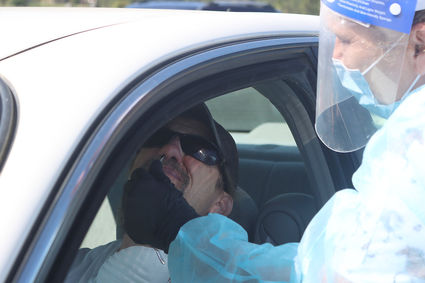4 COVID cases confirmed, fair canceled
July 16, 2020

John Dowd
MOBILE TESTING - Anna Parker (right), a certified medical assistant with Tribal Health, swabs Joe Baker of Polson, who was in Hot Springs getting tested because a co-worker tested positive.
UPDATE: A fourth case of COVID-19 has been confirmed in Sanders County. As a result of Governor Steve Bullock's order on Wednesday, July 15, masks are required in public places in counties with four or more active cases. After the announcement of a fourth case Wednesdays, masks will be required in Sanders County.
The first confirmed cases of COVID-19 in Sanders County were confirmed late Monday. According to Sanders County Public Health, three county residents have tested positive for the virus.
A week prior, a test at Clark Fork Valley Hospital came back positive, but state testing later confirmed that test was false.
While no state or county mandate regarding wearing masks or other restrictions have been put in place, the state remains in Phase Two of precautions. That includes maintaining social distancing of six feet and discouraging gatherings of more than 50 people.
Several businesses, including McGowan Grocery in Plains and First Security Bank branches, have implemented their own restrictions.
The Confederated Salish and Kootenai Tribes (CSKT) are working to protect those most at risk during the outbreak, say local tribal members. This initiative, along with the governor mandated COVID-19 testing, has incentivized areas to attempt to test nearly 60,000 people a month in Montana. CSKT held a testing event in Hot Springs last Thursday at the town's rodeo grounds. It was the fifth of its kind hosted by CSKT, and the first in Sanders County.
Tribal Health employee Chelsea Kleinmeyer called these "snapshot" events, testing events that give the fight against COVID-19 a snapshot of each area, tracking the spread of the pandemic, as well providing care to those who have contracted it.
The testing was done differently, depending on the priority of each case. Cases where it was highly suspect that someone may have COVID-19 a "quick and dirty" test, according to Kleinmeyer, would be done which would come back within 15 minutes. The test is unreliable, however is done in high priority cases, she noted. A second test was being done to those who were low priority and who had few to no symptoms. This test included a nasal swab that would return results within 48 hours. This test is far more reliable and was done to every participant that came through. The "swabbers," as they were dubbed, were medical assistants and staff trained to administer the test. CSKT Tribal Health, along with help from the National Guard, opened up two lanes with five "swabbers" per lane in order to process numerous people.
Community members could drive or walk into the location, and masks were required. The Flathead Reservation Community Action (FRCA) group handed out flyers and spoke with people seeking assistance during the outbreak. The goal of the FRCA is to provide assistance to older members that cannot go to the grocery store, provide minimal supplies to those out of work due to the coronavirus and many other problematic situations members could find themselves in due to the outbreak. Drive-throughs were given a needs request form, which according to Stephen Hunt, one of the workers at the FRCA booth, allows the organization to provide what they call "unconditional mutual aid." This means that anything that they can do to help, they will.
"We're just trying to help our community at this time and trying to take some of the stress off of people," said Hunt.





Reader Comments(0)